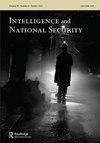Schattenwelten: Österreichs Geheimdienstchef erzählt Schattenwelten: Österreichs Geheimdienstchef erzählt , Gert R. Polli, Graz, Ares Verlag, 2022, 312 pp., (Hardcover) 26,63 Euro, ISBN: 978-3-99081-097
IF 0.8
3区 社会学
Q1 HISTORY
引用次数: 0
Abstract
Click to increase image sizeClick to decrease image size Notes1. The German word ‘erzählt’ can be used very differently. It can simply mean telling, recounting or relating but it also can be used to convey that the content that is told at least doubtful or not believable. One erzählt [tells] fairy tales and especially in Austrian German one also ‘erzählt G’schichtln’. A phrase that directly translates to ‘telling stories’, but it expresses the notion that these stories in best case were (intended) to entertain the listener but should not be taken (too) seriously. But more often the phrase means that what has been told is nonsense, lies or a rumor. Given this connotation it is quite surprising, that the word was used in the title of this book. Especially since the verb ‘berichtet’ that can best directly translated with ‘reports’ would have had the same meaning without a possible subtext and indeed would have been the better fit. Since also German, intelligence services report.影子世界:奥地利情报员告诉影子世界:奥地利情报员情报员说,格特·r·波利,格拉茨,亚瑞斯出版社,2022,312页,(口
单击可增大图像大小单击可减小图像大小注1。德语单词“erzählt”的用法非常不同。它可以简单地表示讲述、叙述或相关,但它也可以用来表达所讲述的内容至少是可疑的或不可信的。一个erzählt(讲)童话故事,特别是在奥地利德语中,还有一个' erzählt G ' schichtln '。这个短语可以直接翻译成“讲故事”,但它表达了这样一种观念,即这些故事在最好的情况下是为了娱乐听众,但不应该(太)认真。但更多时候,这个短语的意思是被告知的是胡说八道、谎言或谣言。考虑到这个含义,这本书的标题中使用这个词是相当令人惊讶的。尤其是动词“berichtet”最能直接翻译成“报告”,它的意思是一样的,没有潜在的潜台词,确实更合适。自也德国,情报部门报告。
本文章由计算机程序翻译,如有差异,请以英文原文为准。
求助全文
约1分钟内获得全文
求助全文
来源期刊

Intelligence and National Security
Multiple-
CiteScore
1.80
自引率
41.70%
发文量
93
期刊介绍:
Intelligence has never played a more prominent role in international politics than it does now in the early years of the twenty-first century. National intelligence services are larger than ever, and they are more transparent in their activities in the policy making of democratic nations. Intelligence and National Security is widely regarded as the world''s leading scholarly journal focused on the role of intelligence and secretive agencies in international relations. It examines this aspect of national security from a variety of perspectives and academic disciplines, with insightful articles research and written by leading experts based around the globe. Among the topics covered in the journal are: • the historical development of intelligence agencies • representations of intelligence in popular culture • public understandings and expectations related to intelligence • intelligence and ethics • intelligence collection and analysis • covert action and counterintelligence • privacy and intelligence accountability • the outsourcing of intelligence operations • the role of politics in intelligence activities • international intelligence cooperation and burden-sharing • the relationships among intelligence agencies, military organizations, and civilian policy departments. Authors for Intelligence and National Security come from a range of disciplines, including international affairs, history, sociology, political science, law, anthropology, philosophy, medicine, statistics, psychology, bio-sciences, and mathematics. These perspectives are regularly augmented by research submitted from current and former intelligence practitioners in several different nations. Each issue features a rich menu of articles about the uses (and occasional misuses) of intelligence, supplemented from time to time with special forums on current intelligence issues and interviews with leading intelligence officials.
 求助内容:
求助内容: 应助结果提醒方式:
应助结果提醒方式:


